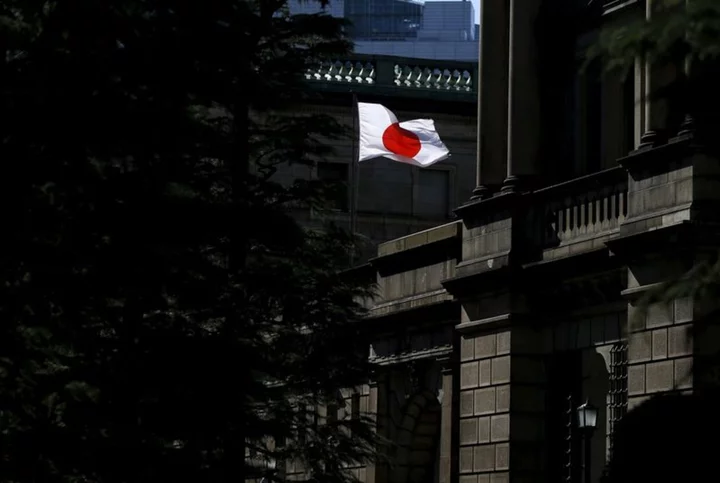By Satoshi Sugiyama
TOKYO The Bank of Japan will hold steady its policy including its yield control scheme at next week's meeting, more than three-quarters of economists polled by Reuters said, as policymakers stress more time is needed for inflation stability.
BOJ Governor Kazuo Ueda has signalled his resolve to maintain its massive monetary stimulus, despite inflation persistently outpacing the bank's 2% target.
Only five of 22 economists, or 23%, expect the BOJ to start scaling back its ultra-loose easing and tweak yield curve control (YCC) at this month's monetary policy review, the July 10-19 survey found, down from 43% in a June poll.
Just half of those respondents, 11 of 22, anticipate a rollback of the central bank's easing policy by year-end.
"The BOJ may start the phase-out in October at the earliest when they release the quarterly price outlook, or in December depending on currency and yield rate situations," said Mari Iwashita, chief market economist at Daiwa Securities.
"It could also be in January next year if they wait to have a glimpse at next year's spring wage negotiations," she said.
A separate question on when the BOJ will end YCC showed a wide range of views. Three of 22 economists said later this year, five chose the first half of next year, six opted for the latter half of next year and eight said for "2025 or later".
If the central bank were to tweak YCC before ending it, 10 economists said it would widen the 10-year yield fluctuation range from the current 0.5% band, while nine said it would change the control target to a shorter yield.
With interest rate differential between Japan and the United States not expected to widen any further, the yen strengthened close to 5% from seven-month-low 145 per dollar hit in late June. The currency traded around 140 per dollar on Friday morning.
Asked about at what yen level the Japanese government would intervene in the market to stem the currency's decline, 14 of 21 economists, or two-thirds, said 150 per dollar. Japan last intervened in the currency market in October.
WAGE GROWTH
Japanese companies offered their biggest pay hike in three decades this year to compensate workers for the rising cost of living. BOJ officials regard sustained wage growth as an essential condition for an exit from ultra-loose policy.
Analysts polled were evenly split on a question asking whether next year's wage growth would be strong enough for the BOJ to consider monetary policy normalisation.
Twelve of 24 said it was likely, including one saying "very likely", whereas the other 12 that would be unlikely.
Hiroshi Namioka, chief strategist at T&D Asset Management, said corporate managers need to rethink their approach to wage growth.
"This year, it was 'prices are going up, and other companies around us seem to be raising wages, so let's raise ours, too,'" he said. "This must be changed to 'raise wages to secure good talent.'"
(For other stories from the Reuters global long-term economic outlook polls package:)
(Reporting by Satoshi Sugiyama; Additional reporting by Kantaro Komiya; Polling by Milounee Purohit and Anant Chandak; Editing by Sam Holmes)

